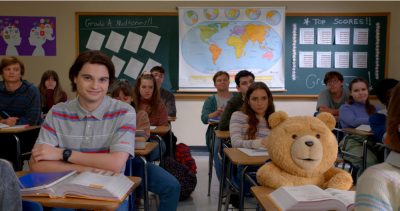It’s 1993 in Framingham, Massachusetts and 16-year-old John Bennett is doing everything a typical high schooler would be doing with his best friend — only his ride-or-die is a 24-inch CGI teddy bear with a huggable oeuvre and a coarsely R-rated vocabulary.
2012’s “Ted” opens with a young, friendless John wishing that, more than anything, his beloved teddy bear would come to life and be his forever best friend. Decades after his dream comes true, he navigates adulthood with Ted in the hit comedy, written and directed by Seth MacFarlane.

Coming from previous TV fame with “Family Guy” and “American Dad!,” MacFarlane’s latest project returns to his roots in a seven-episode prequel of John and Ted’s misadventures — this time in the confines of working-class New England suburbia.
“I think it’s a fresher way to go than another sequel of this story,” MacFarlane said in a media roundtable. “The television style of writing, as opposed to the feature style of writing … you lean into different things, you lean into smaller relationships.”
MacFarlane said he knew he could take Ted to more mediums after throwing him into an interview on “Jimmy Kimmel Live!” where the audience erupted in laughter, despite not being able to actually see the bear.
“We would really want to shoot a pilot to see if this is a terrible idea,” he said to his original idea of a multicam, sitcom-style show. “We said, ‘Look, we’ll just do it the way we did the movies.’ … The fact that we did two movies was very helpful because there were a lot of shortcuts and pitfalls and mistakes that we didn’t have to make when we were getting into this.”
“Ted” executive producers, writers and co-showrunners Brad Walsh and Paul Corrigan hopped into MacFarlane’s project after their Emmy Award-winning success with network sitcom “Modern Family.” Walsh said the R-rated nature of the comedy was never something either of them were given the freedom to do. This, he said, is what makes “Ted” stand apart.
“Comedy lends itself to episodic TV,” Corrigan said. “It’s easier to think of these stories and know you’re going to drop the characters back off where they started, so that in the next episode, you can start [from] scratch and tell more stories.”
As Walsh put it, the episodic comedy tells the stories of “characters who learn nothing.”
MacFarlane said he drew on his family’s own dynamic to fashion the dysfunctional Bennett family’s own dinner table, in all its “Massachusetts flavor.” Hiring his Bostonian co-star Mark Wahlberg, he said, allowed him to personify a profound realism for the stuffed bear, surrounding him by all the “meatheads” in greater Boston.
“Putting Ted in Boston just made the idea of this talking teddy bear coming to life just a little more grounded, a little more accurate, a little more real,” MacFarlane said. “There was a lot of weight to the logic.”
Walsh said he drew on his own New England-rooted childhood to craft the perfect ironic backdrop for John and Ted — like a place that supported a baseball team that, at that time, was “never going to win” any World Series.
“It was part of your identity that you were from a place where the team would always disappoint you, and you were weirdly proud of it,” he said. “So that was fun to be back in that time and that mindset of what New England in 1992 was like.”
Part of the challenge of making a period sitcom is striking enough of a chord with young people today, MacFarlane said.
“I’m always a little shocked that anyone under 40 gets anything out of ‘Family Guy’ these days because the whole writing staff is at least that old,” he said. “Certainly with ‘Ted,’ it was the same.”
MacFarlane said he wanted the series to draw on mainstream jokes and references that could make anyone laugh, not just those who were kids in the ‘80s and ‘90s.
“Luckily, the high school experience, it’s universally terrible for everybody, so we had that thing to go on,” he said. “But you are balancing the specificity with the general, and it’s tough.”
Changing from film to TV allowed for more exploration within characters, MacFarlane said. A lot of the series writes itself, he said, like John and Ted smoking pot for the first time.
“The stories are smaller, they’re more intimate,” he said. “I think by the nature of the change in format, it’s going to feel different. It’s going to feel fresh to people.”
“Ted” premiers on Peacock on Jan. 11, 2024.
















































































































